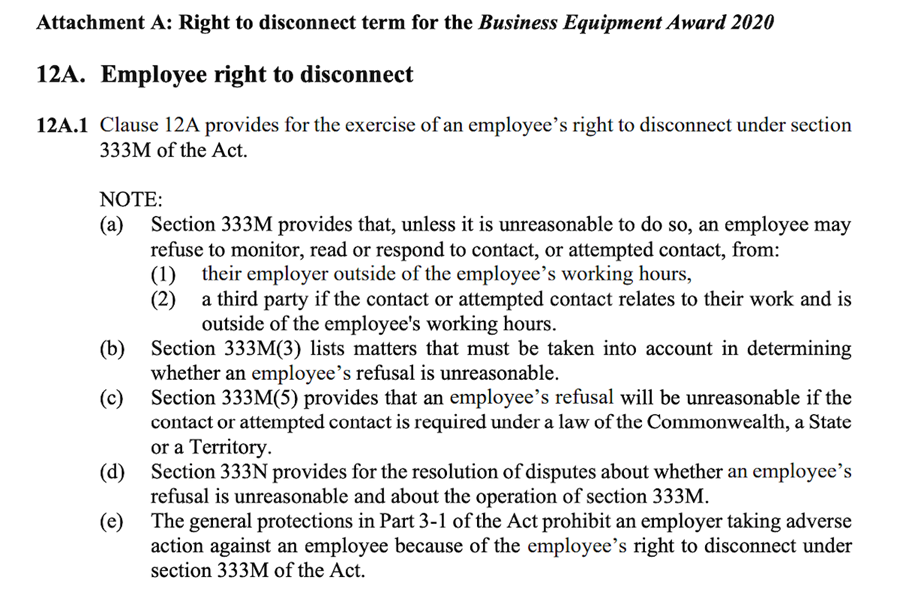
By Catherine Ngo Content writer, presenter and podcaster
A significant raft of Industrial Relations changes has now come into effect. The key reforms are part of the recently enacted Closing Loopholes legislative package. Of the changes, the most controversial one is the Right to Disconnect.
In short, this provision grants employees the right to disregard employer contact during their non-working hours. This "right to disconnect" protects employees from the obligation to monitor, read, or respond to any form of contact or attempted contact related to work outside their designated work hours unless their refusal is deemed " unreasonable."
The Fair Work Commission (FWC) recently published a fact sheet explaining the right to disconnect. This right extends to contact, or attempted contact, from an employer or another person, such as a client, if it is work-related.
Factors that may influence whether a refusal to disconnect is considered "unreasonable" include:
- The reason for the contact or attempted contact.
- The method of contact or attempted contact and the level of disruption it causes the employee.
- The nature of the employee's role and their level of responsibility.
- The employee's personal circumstances, including family or caring responsibilities.
- Whether the employee is compensated or paid extra for remaining available to work when the contact or attempted contact is made or for working additional time outside their ordinary hours.
Finalised wording included in 155 modern awards
The Fair Work Commission has finalised the wording of a ''right to disconnect'' clause, which is now included in 155 modern awards.
A draft term for the Business Equipment Award 2020 was published in July 2024, outlining its potential adaptation across all awards. During the consultation phase, eighteen submissions were received. A full bench of the Commission decided against making fundamental changes to the draft term. The minimalist nature of the term reflects the novelty of the right to disconnect, and the expectation of future variations based on a better understanding of industry-specific issues.
The finalised term begins with the following statement:

Further subclauses set out that:
- The right to disconnect will become effective for non-small employers on August 26, 2024, and one year later for small employers.
- Employers cannot directly or indirectly prevent employees from exercising their right to disconnect as outlined in the Fair Work Act.
- Employers can still require employees to monitor, read, or respond to out-of-hours contact if the employee is receiving a stand-by allowance or if the contact relates to the stand-by.
- Employers can also contact employees about an emergency roster change or a recall to work.
No clear guidance
Australian workplaces face potential uncertainty surrounding the FWC’s guidance on "reasonable" refusals. Employers need more clarity on how regulators and courts might interpret the law.
This ambiguity may lead to more workplace conflicts. Business industry groups have criticised the laws as an unnecessary overreaction to a problem with limited evidence. The laws introduce legal complexities and conflicts that could have been resolved at the workplace level.
The bench added that it intended to wait to make guidelines about the right to disconnect. Once it has overseen disputes related to its operation, it will provide a practical understanding of the issues for which guidance is needed.
"We consider that the Commission will be in a better position to make guidelines once it has dealt with at least some disputes concerning the operation of the right since this will allow it to have some understanding of the practical issues for which guidance may be required."
The terms will be reviewed in approximately 12 months, the bench said.
"This will give parties the opportunity to raise any practical difficulties which they perceive have arisen in the operation of the terms either generally or in particular industries or occupations. This does not of course prevent any party with standing to do so from applying to vary the terms in particular awards pursuant to s 158 of the FW Act prior to that review."
More information into the variation of modern awards to include a right to disconnect term [2024] FWCFB 338 (August 23 2024)
In case you missed it, other IR changes are now in effect:
- Changes in the definition of casual employment and change the pathway from casual to permanent employment and our role in relation to disputes.
- Changes in the general protection provisions in relation to sham contracting and protected workplace rights.
- The FWC now has powers relating to ''employee-like'' workers performing digital platform work, including the ability to make minimum standards orders dealing with disputes about unfair deactivation from a digital platform.
- The FWC now has powers relating to the road transport industry including:
- The ability for new Expert Panels to make minimum standards orders and road transport contractual chain orders, and deal with certain modern award matters.
- Dealing with regulated road transport worker disputes about unfair termination of a contract
- a new road transport objective applying to certain road transport industry matters.
- Allows the FWC to register collective agreements relating to regulated workers and businesses
- Extend some workplace delegates' rights to regulated workers
- The FWC now has powers to deal with disputes about unfair contract terms for independent contractors.
- A new definition of employee and employer for the purposes of the Fair Work Act 2009.
Need help?
My Business Workplace helps businesses navigate HR and the workplace. Get compliant with hundreds of affordable contracts and policies, plus phone advice backed by award-winning lawyers.
Our policies are updated regularly to ensure compliance with legal changes, including the new sexual harassment rules. Download the policy here.



